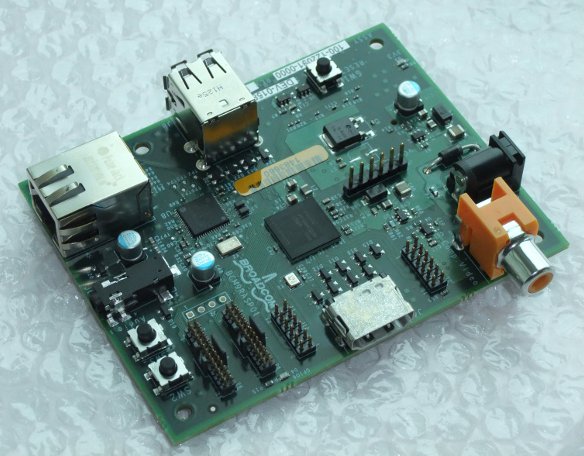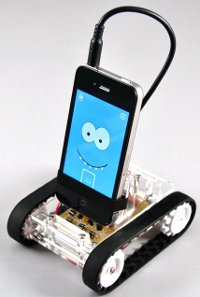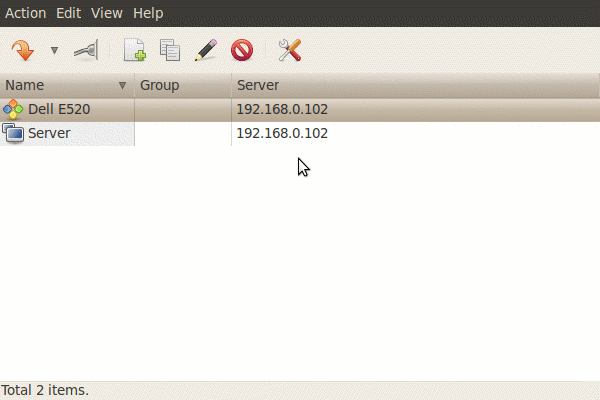Rockchip has announced Android 4.0.1 (ICS) would be ready by the first week of December with Rochchip RK2918 based tablets shipping with the new OS available later in December. The company claims this will be the first Android 4.0 tablet available in the market. That also means that owners of Archos Arnova G2 tablets should be able to run Android 4.0 very soon. The demo below seems relatively smooth compared to other demos I have seen on development boards such as ST Ericsson Snowball, so I suppose Rockchip has already enabled hardware acceleration.
400 Free Raspberry Pi (Development) Boards for Qt 5 Developers
Remember the 25 – 35 USD ARM11 board Raspberry Pi ? Nokia is now getting involved and plans to speed up Qt 5 development on this nice little hardware. The Raspberry Pi Foundation has announced that Nokia would purchase 400 boards next month and give them away to Qt 5 developers who are willing to port software, develop apps, and test and improve the Qt 5 Linux stack. Mostly likely it will be the “high-end” 35 USD version with Ethernet support and 2556 MB RAM as show below. Beside its ridiculously cheap price, the board key features include Linux support, embedded GPU and OpenGL ES libraries that makes it a usable multimedia device capable of outputting 1080p. Nokia and ICS engineers have already started to port Qt to the Raspberry Pi board using the alpha boards. You can see the Qt Quick 2 emitter demo below running on one of the […]
Linaro 11.11 Release with Kernel 3.1.1 and Android 4.0.1 Support
Linaro has just released version 11.11 based on Linux Kernel 3.1.1 and with support for Android ICS. The Android 4.0.1 Preview build for all low cost development boards supported by Linaro are available at http://releases.linaro.org/11.11/android/images-ics-preview/. Here are the highlights of the release: Android Linaro’s baseline has now been upgraded to 2.3.7. The first Versatile Express Android build has been completed. Pandaboard and Vexpress has been upgraded to kernel 3.1.1. A preview of Ice Cream Sandwich is released and running on Snowball, Origen, iMX53 and on Pandaboard with Linaro kernels. A NEON-optimized libpng has been itegrated in all builds. Preliminary DS-5 support has been integrated. Preliminary WiFi support on Android Origen. Kernel config for each build is available on android-build page. USB Ethernet works on Origen. Camera recording function works on Pandaboard. USB camera can be hotplugged on Pandaboard. Developer Platform Firefox can now be cross-built using multiarch. Instructions are available […]
Android 4.0 on ST Ericsson Snowball Development Board
Android 4.0.1 can now run on ST Ericsson Nova A9500 low cost development board “snowball”. The build is available at https://android-build.linaro.org/builds/~linaro-android/staging-snowball/. You can Android 4 (ICS) it in action in the Snowball board in the video build using build number 84. This is a bit sluggish since Android 4 currently lacks hardware acceleration on this development board but Linaro and the igloocommunity will implement it in the next few weeks. If you have an ST Ericsson snowball board, here are the instructions to try the latest Android 4.0 build for the platform: Get the images: wget –no-check-certificate https://android-build.linaro.org/jenkins/job/linaro-android_staging-snowball/lastSuccessfulBuild/artifact/build/out/target/product/snowball/boot.tar.bz2 wget –no-check-certificate https://android-build.linaro.org/jenkins/job/linaro-android_staging-snowball/lastSuccessfulBuild/artifact/build/out/target/product/snowball/system.tar.bz2 wget –no-check-certificate https://android-build.linaro.org/jenkins/job/linaro-android_staging-snowball/lastSuccessfulBuild/artifact/build/out/target/product/snowball/userdata.tar.bz2 Get the linaro-image-tools and create the image: bzr branch lp:linaro-image-tools ./linaro-image-tools/linaro-android-media-create –mmc /dev/sdc –dev snowball_sd –system system.tar.bz2 –userdata userdata.tar.bz2 –boot boot.tar.bz2 MINICOM settings: minicom -D /dev/ttyUSB0 -w -C minicom.txt You must setup the boot args as follows: U8500 $ setenv loadbootscript fat load mmc 1:1 ${loadaddr} […]
“Romo” Robot Controlled by Android or iOS Smartphones
Romotive startup has designed “Romo”, a tank-like Robot controlled by Android or/and iOS mobile devices. Peter Seid and Phu Nguyen – Romotive’s co-founders – have raised over 114,000 USD on KickStarter website from more than 1,100 contributors looking to buy the Romo robot. The company has reached its founding target (32,000 USD) and can now move forward on production. You can still get the Robot for 78 USD (+12 USD shipping if you live outside the US) on KickStarter. You’ll need two Android or iOS devices to play with it: one acting as a camera that sits on the “Romo” and the other to control the robot’s movements and receive the camera stream via Wi-Fi. The motors are interestingly controlled by audio signals coming from the smartphone. Romo’s Hardware is composed of the following: A motorized, acrylic base with an accessory port that can be controlled by any smartphone (or […]
Android 4.0 on BeagleBoard and Beagleboard-xM
Sola has written the instructions (in Japanese) to build Android 4.0 (ICS) for Beagleboard and Beagleboard-xM. Here’s the same in English: Get the source code: $ mkdir -p /home/sola/work/ics $ cd /home/sola/work/ics $ export ANDROID_ROOT=$PWD $ repo init -u https://bitbucket.org/sola/android_manifest $ repo sync -j8 Build Android: $ cd $ANDROID_ROOT $ source build/envsetup.sh $ lunch full_beagleboard_xm-eng [for BeagleBoard-xM] $ lunch full_beagleboard-eng [for BeagleBoard] $ time make -j8 Generate the rootfs: $ cd $ANDROID_ROOT/out/target/product/beagleboard_xm/ [for BeagleBoard-xM] $ cd $ANDROID_ROOT/out/target/product/beagleboard/ [for BeagleBoard] $ mkdir rootfs $ sudo cp -a ./root/* ./rootfs/ $ sudo cp -a ./system/* ./rootfs/system/ Build the kernel: $ export ARCH=arm $ export CROSS_COMPILE=$ANDROID_ROOT/prebuilt/linux-x86/toolchain/arm-eabi-4.4.3/bin/arm-eabi- $ cd $ANDROID_ROOT/board/beagleboard/kernel $ make omap3_beagle_android_defconfig $ make uImage modules -j8 Partition the SD card (bootloader, media, rootfs): $ cd $ANDROID_ROOT/board/beagleboard/sdcard $ sudo LANG=C ./mksdcard_beagle.sh /dev/sdx where /dev/sdx depends on your setup (e.g. /dev/sda). Generate boot.scr: $ cd $ANDROID_ROOT/board/beagleboard/bootscript $ ./mkbootscr Copy MLO/u-boot.bin/uImage/rootfs to the SD card: […]
CIFS/Samba Support, USB Drive and Keyboard/Mouse for Android 4.0
Paul O’Brien, founder of modaco, has created a custom kernel with CIFS/SAMBA support, USB drive and keyboard / mouse support for Galaxy Nexus smartphone running Android 4.0 (ICS). This is a temporary download until MCR (MoDaCo Custom ROM) is released. This should be flashed via ‘fastboot flash boot boot.mck.img’ to a device with an unlocked bootloader. This is designed for devices running the I9250XXKK1 / ITL41D (android-4.0.1_r1) ROM. DOWNLOAD – MD5: adf6bcc42205027952630dcf720beada Source: http://android.modaco.com/topic/348882-23-nov-modaco-custom-kernel-cifs-usb-drives-keyboard-mouse/
Remmina : Remote Connection via RDP, VNC, SSH, XDMCP or SFTP
If you need to connect to both Windows and Linux machines remotely, Remmina is what you need. It is an application that can remotely connect to server using VNC, SSH, XDMCP, SFTP and RDP protocols. So that you can connect to a Windows machine using the default RDP (Remote Desktop Protocol) protocol without installing a VNC server. In the screenshot below I setup a Windows RDP and a VNC connection to 192.168.0.102. There are plenty of options. Here’s a screenshot of Remote Desktop Preferences for the RDP client. To install in an Ubuntu or Debian distribution:
|
1 |
sudo apt-get install remmina |
To install it in Fedora:
|
1 |
sudo yum install remmina |









